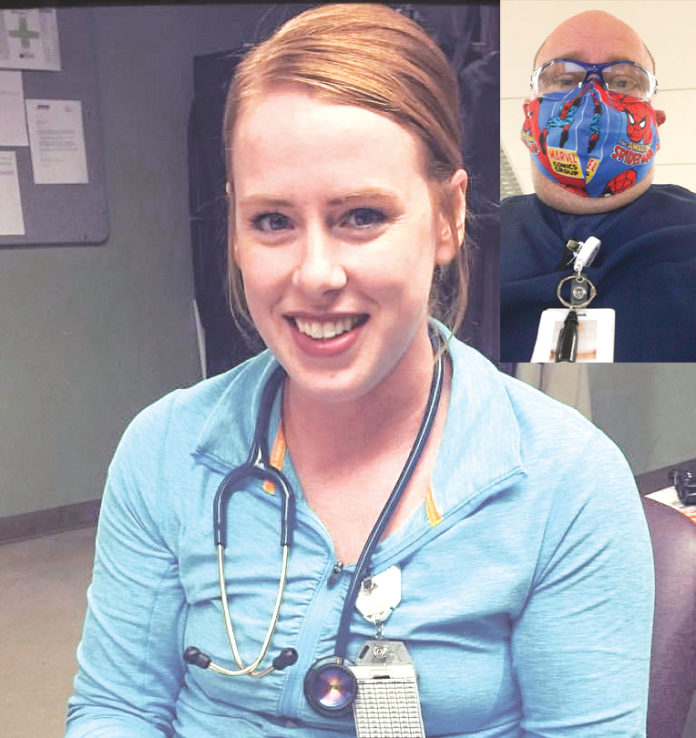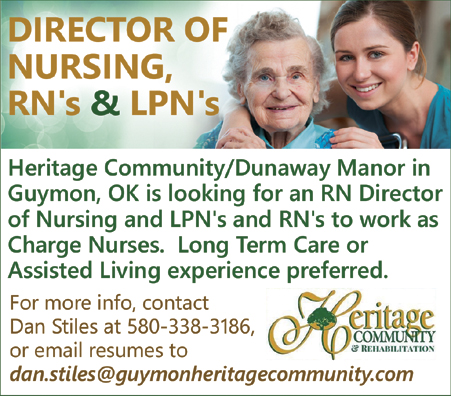
by Bobby Anderson, RN, Staff Writer
The numbers are deceiving.
The first shift I was back, Starbucks was gracious enough to send coffee. Another woman sent several boxes of Girl Scout cookies.

Long Term Care or Assisted Living experience preferred.
For more info, contact Dan Stiles at 580-338-3186, or email resumes to [email protected]
We get things all the time now, a byproduct of people with nothing but time on their hands and a desire to do something – anything – when they’re being asked to stay at home.
One of the aides tending to the distribution of both saw one of our senior hospitalists and playfully asked him if he wanted a cookie.
“No, I want people to stop dying,” he said, and sat down to his dictation.
It was barely noon and already three of his Covid-19 patients had expired and one more was expected by day’s end.
It’s not like you hear about in New York hospitals where patient beds are lined up in hallways and staff are wearing ponchos or in Detroit where bodies are piled up.
But it’s a sinister death, nonetheless.
And it looks unlike and acts unlike anything we’re used to seeing.
Later that day, we received a DNR patient with a poor prognosis but stable enough to transfer.
His Covid-19 test was negative but he still died alone, his final moments taken from his family by this virus.
The virus is taking something from all of us.
In the hospital, you can see it with specialty floors closed and elective surgeries canceled.
There’s different faces in a lot of different places. The guy scanning your temperature in the morning before you enter the building is an occupational therapist on your floor most days.
The sitter for your altered patient is a physical therapy assistant.
The oncology nurse you have to call to come administer your patient’s chemo drug is orienting on your floor because her floor is closed. She’s there to train because you might have to overflow your patients there if the expected surge eventually happens.
Everyone’s just trying to get their hours instead of opting off and burning through their paid time off.
It’s a new normal, at least for now.
But some things won’t ever be normal.
The whole PPE thing in public is getting to me, too.
It’s kind of like watching medical dramas on TV when they shock asystole or the physician hangs a medication after starting an IV.
It’s not how it’s done.
Watching people scratch their face in gloves or pulling surgical masks down under their nose “so they can breathe” is like nails on a chalkboard.
But everyone is living through this the best they can.
And we’re all in it together.
At Integris Canadian Valley Hospital, Caitlin Coppock, RRT-Adult Critical Care Specialist, has found herself staying hyper-vigilant.
In Caitlin’s own words:
It has made me more aware of my surroundings, my mental health and what I’m doing to stay in a good place, and of course has also impacted my home life.
My husband is in CRNA school and so we have had a challenging year already with him being out of state and the pressure of providing for both of us, so we are trying to figure out the new norm for him while I am feeling pressure of what is to come at the hospital.
I’m trying to just stay focused and positive.
It’s hard with COVID-19 being all you hear about and it’s coming at you from work and news and literally everywhere. There are days where I leave in tears, but once I get that emotional release, I pull myself together and get back to it.
I think unless people have truly walked through what we are starting to see at the bedside, it’s very hard to understand.
A few weeks ago, I made the conscious decision to let go of the uncontrollables, which are many currently, and to try to stay focused on what I can do to be the best RT I can during this time.
We all have frustrations and fears but staying focused on what we can do to make it better and researching and networking with therapists not just in Oklahoma but across the country is how I have learned to cope. I also have found it important to focus on my physical health by getting plenty of exercise and fresh air on my days off and spending as much time with my husband and dogs that I can.
Regardless of what is to come, I know that we are a unified group of caregivers and will do what we can do to treat our patients, but I worry for the mental and physical health and safety of those I work with on a daily basis.
Without each other doing what we do, we can’t treat these patients.












